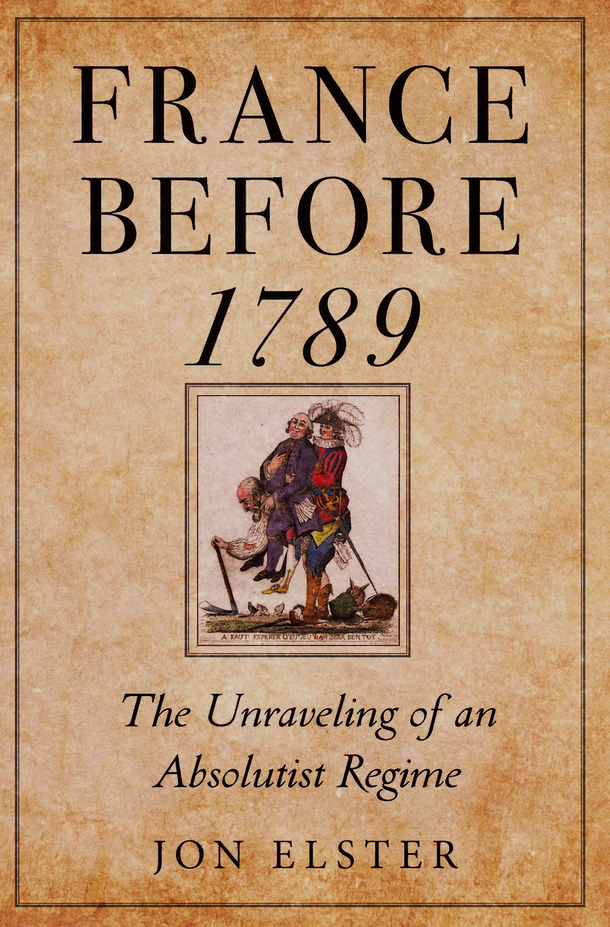
Books
Will Contemporary Democracies Sooner or Later be Labelled ‘Ancient Régimes’?
The first impression that settles with the reader upon picking up this volume is why yet another volume on the micro-history of France’s ancient régime. In reading Jon Elster’s France before 1789: The Unraveling of an Absolutist Regime, I’ve become convinced that this topic is indeed inexhaustible, particularly as we wonder about the similarities between several contemporary polities and pre-1789 France. The philosopher/psychologists-turning-a-historian seeks those thresholds (sentiments) which once crossed, a revolution becomes simply irreversible.
It can be confusing to register these thresholds, measure the intensity of each and gauge the way they coalesce to either trigger a chain reaction leading to the point of no return or otherwise remains a false signal that enforces the enduring status quo. Elster prefaces his research with the fact that the ancient régime had been always short of money and was always teetering on bankruptcy. It always managed to avoid collapse, until it couldn’t. The accurate reading of the circumstances ending in the demise were not different from similar exceptionally grave crises before. Indeed, these similarities blinded the monarchy as well as its enemies (both foreign governments and France’s bourgeoisie) from noting the revolution once they saw it unfolding.
Elster deems the psychological conditions and emotions of ancient régime society key in explaining the collapse of 1789. The thresholds Elster focuses on become tangible through the totality of contradictions in basic emotions: anger, envy, greed, and a sense of injustice. These are often intensified by feelings of quid pro quo; those favors or privileges a sovereign or state officials grant in order to make concessions for a past misdeed. Invested in the short term to generate urgent income for their coffers by any means possible, feelings of quid pro quo contributed to the desacralization of the royals’ status as invisible representatives of God on earth.
The introduction makes certain disclaimers. While France’s ancient régime was absolutist, it was never tyrannical. Elster makes the case against identifying French monarchs as Oriental despots, not so even when learning that they established des cabinets noirs and read their subjects’ correspondences. The second disclaimer had been the financial burden, sometimes, bankruptcy, which the regime had to endure throughout its long tenure. For a multitude of reasons, the monarchy was poorly managed. At no point did it know how much it owned and how much it needed precisely. The desacralization of the person of the king and the decline of religious fever poured fuel on the fire that become the explosion of 1789.
After setting the scene for readers to register the governing principles of life in prerevolutionary France in the intro, chapter two discusses how privilege or exemptions from taxation for the nobility and the clergy created a heavily charged atmosphere where the brunt of state finances fell on the Third Estate or commoners. The atmosphere does not only smack of injustice but also of préséance (the desire for status). More than injustice, préséance created a quasi-permanent dysfunctionality in the affairs of the state.
Even when some could rear more heads of cattle or plow more land, peasants avoided doing so because the slightest signs of affluence would invite more taxation. Obviously, wars which successive kings waged aggravated the peasants’ misfortunes as the scarcity of resources pushed both the state and antagonistic social groups to be ‘averted to inaction,’ underlining an electrified situation where the urgency for decision-making becomes less than rational. Peasants would mount a rebellion (jacqueries) based on rumors of tax increases, conscription, or any other perceived injustice. Similarly, kings wage foreign wars on impulse, often in pursuit of glory, overlooking the cost which can be ruinous both financially and politically. Adding insult to injury, the entire melodrama of decision-making take place in the absence of reliable estimates (let alone solid information).

Accelerating the findings of the second chapter, chapter three starts abstracting the anomalies of l’ancient régime. Injustice, Elster specifies, take two forms: horizontal and vertical. Horizontal injustice refers to the arbitrary forms of taxation and conscription throughout the kingdom. Given the effects of wars, draughts, and disasters, various parts of the kingdom could not be taxed similarly at one time. Yet, variations became a serious source of discontent. Vertical injustice underlines the differences in how the king, the church, and the state extracted value from the peasantry. In order to harvest higher taxes, each rival courted the attention of the peasantry, pretending to act as its best patron and promising to shield it from the predatory tactics of the other two.
Chapters four and five discuss the contradictions of governing during this time. The relations between the three bodies were often less than smooth, even tense since charges of scarcity were blamed on hoarders and speculators. Explanations such as these are rooted in “long-standing mental schemata, explaining the agency-bias,” thanks to which somehow and somewhere certain social groups are thriving precisely from the misery of the multitudes. Not having the luxury to dedicate time and efforts to trace the source of rumors, the authorities always suspected that a subversive activity was underway, escalating the tension where a more nuanced approach could have simply overlooked and allowed the rumors to subside on their own. The authorities always feared coordinated action on the part of the courts, magistrates, and clergy. Elster notes that sometimes an unintentional agreement between the various bodies of the government caused kings to tremble and tension to arise, unnecessarily of course.
Among its other preoccupations, the conclusion sheds light on the impossibility of exhausting the archives, hence a complete and thorough understanding of the mechanism of ruling during France’s ancient régime. The archival materials, Elster deems, are incomplete and hence the knowledge derived from the ones existing remains incomplete. In a section titled “Second Best?” Elster suspects the theory that venal and highly politicized courts had been an evil that “limited a still greater evil” since posts of judges were inherited and as such the collapse of the monarchy was avoidable. This reading attempts to reinvent the wheel, as the entire arrangement was rotten and crumbling from the inside and largely had been bypassed by time.
Elster’s core observation that French monarchs always lacked money is only half true. French kings were not short of capital. Rather, they lacked the means of wealth production. The feudal arrangement eventually became obsolete. Towards the end of Louis XVI’s reign, wealth production had been working on a subterranean level. The lack of monopoly over money resulted in having monarchs slowly but surely no longer the masters of the game of production. As such, Louis was no longer the absolute monarch his ancestors used to be.
Still, the revolution was not what the French would call un raté de la part de dernier roi (a failure on the part of the last king) as the bourgeoisie’s propaganda often described him as both degenerate and irresponsible. Not at all. Closely considered, why would the bourgeoisie have to abide by the code (taxation but also the coordinates of power that keeps wealth generation outside its scope), a situation that kept it constantly stifled and unable to expand? If anything, 1789 illustrates that the bourgeoise really took over when by that time it formally had power in its hand. That explains why cogitations over feelings and emotions read like masturbations a l’infini since emotions and feelings do not have an independent scenario on their own. Peasants’ anger, even fury, does not begin to compare with that of les nouveau riches of the time. Nevertheless, it was the peasant’s fury that had been unleashed to press none but the agenda of the bourgeoisie.
In the final analysis though, and from a purely methodological point of view, anger, fury, or courage alone does not end in a revolution. Not even when the totality of these emotions triggered the social explosion of 1789. In founding his arguments on emotions, Elster is implicitly suggesting that everyone’s anger matters. He thus is explaining the revolution as narcissistic displays of equal egos, which is different from noting those affective quantities as they crossed a given threshold in order for the revolution to become irreversible. The reality though underlined the overall totality (not the additive summation), the ones that codified the intense contradictions of these effective quantities. The codification triggered a qualitative (certainly, not quantitative) opening toward an anti-feudal arrangement in France even if that arrangement tolerated nominal restorations afterward.
Overall, Elster’s analysis is geared to blur similarities between France’s ancient régime and contemporary self-called democracies. His take on le cabinet noir and the royals’ practice of reading their subjects’ mail is made to look like a practice from the long-dead, shameful, and impossibly irretrievable past. In the context of the Pegasus Affair and all preparations leading to the American Data Privacy and Protection Act (ADPPA), one wonders how many present days polities will be sooner or later labeled ancient régimes.
